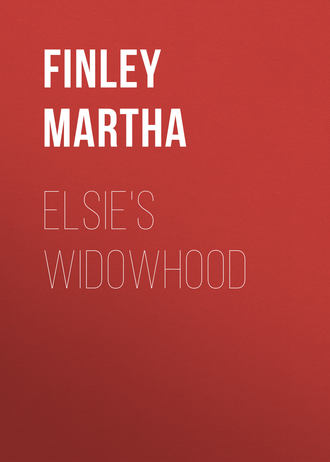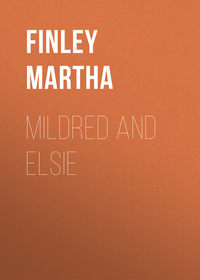 полная версия
полная версияElsie's Widowhood

Martha Finley
Elsie's Widowhood / A Sequel to Elsie's Children
PREFACE
It was not in my heart to give to my favorite child, Elsie, the sorrows of Widowhood. But the public made the title and demanded the book; and the public, I am told, is autocratic. So what could I do but write the story and try to show how the love of Christ in the heart can make life happy even under sore bereavement? The apostle says, "I am filled with comfort, I am exceeding joyful in all our tribulation;" and since trouble, trial and affliction are the lot of all in this world of sin and sorrow, what greater kindness could I do you, dear reader, than to show you where to go for relief and consolation? That this little book may teach the sweet lesson to many a tried and burdened soul, is the earnest prayer of your friend,
The Author.CHAPTER I
"All love is sweet,Given or returned. Common as light is love,And its familiar voice wearies not ever."– Shelley."Come in, Vi, darling," said Mrs. Travilla's sweet voice, "we will be glad to have you with us."
Violet, finding the door of her mother's dressing-room ajar, had stepped in, then drawn hastily back, fearing to intrude upon what seemed a private interview between her and her namesake daughter; Elsie being seated on a cushion at her mamma's feet, her face half hidden on her lap, while mamma's soft white hand gently caressed her hair and cheek.
"I feared my presence might not be quite desirable just now, mamma," Violet said gayly, coming forward as she spoke. "But what is the matter?" she asked in alarm, perceiving that tears were trembling in the soft brown eyes that were lifted to hers. "Dear mamma, are you ill? or is Elsie? is anything wrong with her?"
"She shall answer for herself," the mother said with a sort of tremulous gayety of tone and manner. "Come, bonny lassie, lift your head and tell your sister of the calamity that has befallen you."
There was a whispered word or two of reply, and Elsie rose hastily and glided from the room.
"Mamma, is she sick?" asked Violet, surprised and troubled.
"No, dear child. It is – the old story: " and the mother sighed involuntarily. "We cannot keep her always; some one wants to take her from us."
"Some one! oh who, mamma? who would dare? But you and papa will never allow it?"
"Ah, my child, we cannot refuse; and I understand now, as I never did before, why my father looked so sad when yours asked him for his daughter."
Light flashed upon Violet. "Ah mamma, is that it? and who – but I think I know. It is Lester Leland, is it not?"
Her mother's smile told her that her conjecture was correct.
Violet sighed as she took the seat just vacated by her sister, folded her arms on her mother's lap, and looked up with loving eyes into her face.
"Dear mamma, I am so sorry for you! for papa too, and for myself. What shall I do without my sister? How can you and papa do without her? How can she? I'm sure no one in the world can ever be so dear to me as my own precious father and mother. And I wish – I wish Lester Leland had never seen her."
"No, darling, we should not wish that. These things must be; God in his infinite wisdom and goodness has so ordered it. I am sad at the thought of parting with my dear child, yet how could I be so selfish as to wish her to miss the great happiness that I have found in the love of husband and children?"
Violet answered with a doubtful "Yes, mamma, but – "
"Well, dear?" her mother asked with a smile, after waiting in vain for the conclusion of the sentence.
"I am sure there is not another man in all the world like papa; not one half so dear and good and kind and lovable."
"Ah, you may change your mind about that some day. It is precisely what I used to think and say of my dear father, before I quite learned the worth of yours."
"Ah, yes, I forgot grandpa! he is – almost as nice and dear as papa. But there can't be another one, I'm very, very sure of that. Lester Leland is not half so nice. Oh I don't see how Elsie can!"
"How Elsie can what?" asked her father, coming in at that moment, and regarding her with a half quizzical look and smile.
"Leave you and mamma for somebody else, you dear, dear, dearest father!" returned Vi, springing up and running to him to put her arms about his neck and half smother him with kisses.
"Then we may hope to keep you for a good while yet?" he said interrogatively, holding her close and returning her caresses in most tender fatherly fashion, the mother watching them with beaming eyes.
"Yes, indeed; till you grow quite, quite tired of me, papa."
"And that will never be, my pet. Ah, little wife, how rich we are in our children! Yet not rich enough to part with one without a pang of regret. But we will not trouble about that yet, since the evil day is not very near."
"Oh isn't it?" cried Violet joyously.
"No; Lester goes to Italy in a few weeks, and it will be one, two, or maybe three years before he returns to claim his bride."
"Ah, then it is not time to begin to fret about it yet!" cried Vi, gleefully, smiles chasing away the clouds from her brow.
At her age a year seems a long while in anticipation.
"No, daughter, nor ever will be," her father responded with gentle gravity. "I hope my little girl will never allow herself to indulge in so useless and sinful a thing as fretting over either what can or what cannot be helped."
"Ah, you don't mean to let me fret at all, I see, you dear, wise old papa," she returned with a merry laugh. "Now I must find Elsie and pass the lesson over to her. For I shrewdly suspect she's fretting over Lester's expected departure."
"Away with you then!" was the laughing rejoinder, and she went dancing and singing from the room.
"The dear, merry, light-hearted child," her father said, looking after her. "Would that I could keep her always thus."
"Would you if you could, my husband?" Mrs. Travilla asked with a tender smile, a look of loving reverence, as he sat down by her side.
"No, sweet wife, I would not," he answered emphatically; "for, as Rutherford says, 'grace groweth best in winter;' and the Master says, 'As many as I love, I rebuke and chasten.'"
"Yes; and 'we must through much tribulation enter into the kingdom of God.' Ah, we could never choose for our precious children exemption from such trials and afflictions as He may see necessary to fit them for an eternity of joy and bliss at His right hand!"
"No; nor for ourselves, nor for each other, my darling. But how well it is that the choice is not for us! How could I ever choose a single pang for you, beloved? vein of my heart, my life, my light, my joy!"
"Or I for you, my dear, dear husband!" she whispered, as he drew her head to a resting place upon his breast and pressed a long kiss of ardent affection on her pure white brow. "Ah, Edward, I sometimes fear that I lean on you too much, love you too dearly! What could I ever do without you – husband, friend, counsellor, guide – everything in one?"
Violet went very softly into her sister's dressing-room and stood for several minutes watching her with a mixture of curiosity, interest and amusement, before Elsie became aware of her presence.
She sat with her elbow on the window seat, her cheek in her hand, eyes fixed on some distant point in the landscape, but evidently with thoughts intent upon something quite foreign to it; for the color came and went on the soft cheeks with every breath, and conscious smiles played about the full red lips.
At last turning her head and catching her young sister's eye, she crimsoned to the very forehead.
"O Elsie, don't mind me!" Violet said, springing to her side and putting her arms around her. "Are you so very happy? You look so, and I am glad for you; but – but I can't understand it."
"What, Vi?" Elsie asked, half hiding her blushing face on her sister's shoulder.
"How you can love anybody better than our own dear, darling, precious papa and mamma."
"Yes, I – I don't wonder, Vi," blushing more deeply than before, "but they are not angry – dear, dear mamma and papa – it seems to me I never loved them half so dearly before – and they say it is quite natural and right."
"Then it must be, of course; but – I wish it was somebody else's sister and not mine. I can't feel as if a stranger has as much right to my own sister as I have; and I don't know how to do without you. O Elsie, can't you be content to live on always in just the way we have ever since we were little bits of things?"
Elsie answered with an ardent embrace and a murmured "Darling Vi, don't be vexed with me. I'm sure you wouldn't if you knew how dearly, dearly I love you."
"Well, I do suppose you can't help it!" sighed Violet, returning the embrace.
"Can't help loving you? No, indeed; who could?" Elsie returned laughingly. "You wouldn't wish it, surely? You value my affection?"
"Oh you dear old goose!" laughed Violet; "but that was a wilful misunderstanding. None so stupid as those that won't comprehend. Now I'll run away and leave you to your pleasant thoughts. May I tell Molly?"
"Yes," Elsie answered with some hesitation, "she'll have to know soon. Mamma thinks it should not be kept secret, though it must be so long before – "
"Ah, that reminds me that I was to pass over to you the lesson papa just gave me – that fretting is never wise or right. I leave you to make the application," and she ran gayly away.
So joyous of heart, so full of youthful life and animation was she that she seldom moved with sedateness and sobriety in the privacy of home, but went tripping and dancing from room to room, often filling the house with birdlike warblings or silvery laughter.
Molly Percival sat in her own cheery, pleasant room, pen in hand and surrounded by books and papers over which she seemed very intent, though now and then she lifted her head and sent a sweeping glance through the open window, drinking in with delight the beauties of a panorama of hill and dale, sparkling river, cultivated field and wild woodland, to which the shifting lights and shadows, as now and again a fleecy, wind-swept cloud partially obscured the brightness of the sun, lent the charm of endless variety.
Molly's face was bright with intelligence and good humor. She enjoyed her work and her increasing success. And she had still another happiness in the change that had come over her mother.
Still feeble in intellect, Enna Johnson had become as remarkable for gentleness and docility as she had formerly been for pride, arrogance and self-will.
She had grown very fond of Molly, too, very proud of her attainments and her growing fame, and asked no greater privilege than to sit in the room with her, watching her at her work, and ever ready to wait upon and do her errands.
And so she, too, had her home at Ion, made always welcome by its large-hearted, generous master and mistress.
"Busy, as usual, I see," remarked Violet, as she came tripping in. "Molly, you are the veriest bee, and richly deserve to have your hive full of the finest honey. I'm the bearer of a bit of news very interesting to Elsie and me, in fact I suppose I might say to all the family. Have you time to hear it?"
"Yes, indeed, and to thank you for your kindness in bringing it," Molly answered, laying down her pen and leaning back in a restful attitude. "But sit down first, won't you?"
"Thank you, no; it's time to dress for dinner. I must just state the fact and run away," said Violet, pulling out a tiny gold watch set with brilliants. "It is that Elsie and Lester Leland are engaged."
"And your father and mother approve?" asked Molly in some surprise.
"Yes, of course; Elsie would never think of engaging herself to anybody without their approval. But why should they be expected to object?"
"I don't know, only – he's poor, and most wealthy people would consider that a very great objection."
Violet laughed lightly. "What an odd idea! If there is wealth on one side, there's the less need of it on the other, I should think. And he is intelligent, sensible, talented, amiable and good; rather handsome too."
"And so you are pleased, Vi?"
"Yes, no, I don't know," and the bright face clouded slightly. "I wish – but if people must marry, he'll do as well as another to rob me of my sister, I suppose."
She tripped away, and Molly, dropping her head upon her folded arms on the table, sighed profoundly.
Some one touched her on the shoulder, and her mother's voice asked, "What's the matter, Molly? You don't envy her that poor artist fellow, do you? You needn't: there'll be a better one coming along for you one of these days."
"No, no; not for me! not for me!" gasped the girl. "I've nothing to do with love or marriage, except to picture them for others. It's like mixing delicious draughts for other lips, while I – I may not taste them – may not have a single drop to cool my parched tongue, or quench my burning thirst."
At the moment life seemed to stretch out before her as a dreary waste, unbrightened by a single flower – a long, toilsome road to be trod in loneliness and pain. Her heart uttered the old plaint: "They seem to have everything and I nothing."
Then her cheek burned with shame, and penitent tears filled her eyes, as better thoughts came crowding into her mind.
Had she not a better than an earthly love to cheer, comfort, and sustain her on her way? – a love that would never fail, a Friend who would never leave nor forsake her; whose sympathy was perfect; who was always touched with the feeling of her infirmities, and into whose ear she could ever whisper her every sorrow, perplexity, anxiety, certain of help; for His love and power were infinite.
And the minor blessings of her lot were innumerable: the love of kindred and friends, and the ability to do good and give pleasure by the exercise of her God-given talents, not the least.
CHAPTER II
"Marriage is a matter of more worthThan to be dealt in by attorneyship."– Shakespeare.Lester Leland would sail in a few weeks for Europe. He was going to Italy to study the great masters, and with the determination to spare no effort to so perfect himself in his art that his fame as the first of American sculptors should constitute a prize worthy to lay at the feet of his peerless Elsie.
Their engagement was presently made known to all the connection, and with no pledge or request of secrecy, her parents deeming such a course wisest and kindest to all parties. Elsie had many suitors, and it was but just to them to let it be understood that her selection was made.
The communication was by note to each family, which note contained also an invitation to a family dinner at Ion, given in honor of the newly affianced pair.
Of course the matter called forth more or less of discussion in each household, every one feeling privileged to express an opinion in regard to the suitableness of the proposed match.
It created some surprise at the Oaks, but as Lester was liked and his genius admired by them all, there were no unfavorable comments.
At Ashlands the news was received in much the same way, Herbert remarking, "Well, as it isn't Vi, I don't care a pin."
Everybody at Fairview was delighted. At Pinegrove it was pronounced "an odd affair," but just like the Travillas; in choosing their friends and associates they never seemed to look upon wealth as a recommendation, or the want of it as an objection.
It was at breakfast-time that the note of invitation, addressed to old Mr. Dinsmore, reached Roselands. He glanced over it, then read it aloud.
"My great-granddaughter engaged to be married!" he remarked, as he laid it down. "I may well feel myself an aged patriarch! Though 'few and evil have the days of the years of my life been,'" he added, low and musingly, ending with a heavy sigh.
"No such thing, father!" said Mrs. Conly, in a quick, impatient tone. "I'm not going to hear you talk so about yourself; you who have been always an honorable, upright, polished gentleman."
"But what a wretched mésalliance is this!" she commented, with covert delight, taking up the note and glancing over its contents. "A poor artist, destitute of fame and money alike, to mate with an heiress to hundreds of thousands! Why, poor as I and my children are, I should have rejected overtures from him for one of my girls with scorn and indignation."
"Which would have been a decided mistake, I think, mother," remarked Calhoun, respectfully. "Leland is a fine fellow, of good family, and very talented. He'll make his mark some day, and you may live to take pride in saying that the wife of the famous sculptor Leland is a niece of yours."
"A half grandniece," she corrected, bridling. "But I shall be an ancient dame indeed before that comes to pass."
"I have found him a very gentlemanly and intelligent fellow," remarked Arthur; "and as for money, Elsie is likely to have enough for both."
"So she is," said the grandfather.
"And he is thoroughly good, and will make a kind and appreciative husband," added Isadore.
Virginia looked scornful and contemptuous. "He's too goody-goody for me," she said, "but just like the Travillas in that, so will fit in exactly, I presume. Well, if people like to make fools of themselves, I don't see that we need be unhappy about it. We'll accept the invitation, of course, mamma?" turning to her mother; "and the next question is, what shall we wear?"
"We must make handsome dinner toilets, of course," was the reply; "for, though none but relatives and connections are to be present, it will be a large company."
"Yes, and I've no fancy for being outshone by anybody, and Aunt Rose is sure to be very elegantly attired; Cousin Rose Lacey and Cousin Horace's wife no less so. Talk of my fondness for dress! It's small compared to theirs."
"It is principally the doing of the husbands," said Isadore. "Both – or I might say all three, for Uncle Horace is no exception – are very fond of seeing their wives well dressed."
"An excellent trait in a gentleman – the determination that his nearest female relatives shall make a good appearance," remarked Mrs. Conly, significantly, glancing from father to sons.
"But the ability to bring it about is not always commensurate with the desire, mother," said Isadore.
"Thank you, Isa," said Calhoun, following her from the room, for she had risen from the table with her last words; "my mother does not seem to comprehend the difference between our circumstances and those of some of our relatives, and I am sure has no idea of the pain her words sometimes give to grandpa, Art, and myself."
"No, Cal, or she could never be so cruel," Isa answered, laying her hand affectionately on his arm and looking lovingly into his eyes. "I know that my brothers deny themselves many an innocent gratification for the sake of their mother and sisters: and Cal, I do appreciate it."
"I know you do, Isa. Now tell me what you will want for this – "
"Nothing," she interrupted, with an arch smile up into his face. "Do you suspect me of praising your generosity for a purpose? I have everything I want for the occasion, I do assure you. But, Cal, what do you suppose Uncle Horace will think of Elsie's choice?"
"He will not object on the score of Leland's lack of wealth, unless I am greatly mistaken. But here he comes to speak for himself," he added, as a horseman was seen coming up the avenue at a brisk canter.
They were standing in the hall, but now stepped out upon the veranda to greet Mr. Dinsmore as he alighted, giving his horse in charge to a young negro who came eagerly forward to do the service, quite sure that he would be suitably rewarded.
It was the lad's firm conviction that "Massa Horace" possessed an inexhaustible supply of small coin, some of which was very apt to be transferred to the pockets of those who waited upon him.
Greetings were exchanged and Mr. Dinsmore said, "I am on my way to Ion. Suppose you order your pony, Isa, and ride over with me. They will be glad to see you. I want a few moments chat with my father, and that will give you time to don your hat and habit."
Isadore was nothing loath, and within half an hour they were on their way.
"You have heard the news?" her uncle remarked inquiringly.
"Of Elsie's engagement? Yes, sir. You were discussing it with grandpa and mamma, were you not?"
"Yes," and he smiled slightly.
"You don't think as she does about it, uncle?"
"No, I am fully satisfied; that the young man is well-bred, good, amiable, honest, intelligent, educated, talented and industrious seems to me quite sufficient. My only objection is that the engagement seems likely to be a long one. And yet that has the advantage of leaving the dear child longer in her father's house."
"Of which I for one am very glad," said Isa. "What a sweet girl she is, uncle!"
"Yes; she strongly resembles her mother in person and character; has always seemed to me a sort of second edition of her."
They found the Travillas, old and young, all out on the veranda enjoying a family chat before scattering to their various employments for the day.
Grandpa, though seldom a day passed without a visit from him to Ion, was welcomed with all the effusion and delight that might reasonably have been expected if he had not been seen for a month. His daughter's eyes shone with filial love and pleasure as they exchanged their accustomed affectionate greeting, and, as he took possession of the comfortable arm-chair Mr. Travilla hastened to offer, his grandchildren clustered about him, the little ones climbing his knees with the freedom and fearlessness of those who doubted neither their right nor their welcome.
But in the meantime Isadore was not forgotten or overlooked. She too was quite at home at Ion and always made to feel that her visits were esteemed a pleasure.
There was a slight timidity of manner, a sweet half shyness about the younger Elsie this morning that was very charming. Her eyes drooped under her grandfather's questioning look and smile and the color came and went on her fair cheek.
He said nothing to her, however, until the younger ones had been summoned away to their studies, then turned to her with the remark, "I must congratulate Lester Leland when next I see him. Well, my dear child, I trust you have not made a hasty choice?"
"I think not, grandpa; we have known each other quite intimately for several years," she answered, casting down her eyes and blushing deeply. "You do not disapprove?"
"I have no right to object if your parents are satisfied," he said. "But there, do not look uncomfortable; I really think Lester a fine fellow, and am quite willing to number him among my grandchildren."
She gave him a bright, grateful look; then she and Isa stole away together for a little girlish confidence, leaving the older people to a more business-like discussion of the matter.
On every subject of grave importance Mr. Dinsmore was taken into the counsels of his daughter and her husband. His approval on this occasion, though they had scarcely doubted it, was gratifying to both.
There were no declinations of the invitation to the family dinner-party, and at the appointed time the whole connection gathered at Ion – a large and goodly troop – the adults in drawing-room and parlors, the little ones in the nursery.
There was the Roselands branch, consisting of the old grandfather, with his daughter, Mrs. Conly, and her numerous progeny.
From the Oaks came Mr. Horace Dinsmore, Sr., and Mr. Horace Dinsmore, Jr., with their wives and a bright, beautiful, rollicking year-old boy, whom the proud young father styled Horace III.; also Molly's half brother and sister, Bob and Betty Johnson, to whom their uncle and aunt still gave a home and parental care and affection.
All the Howards, of Pinegrove, were there too – three generations, two of the sons bringing wives and little ones with them.
The Carringtons, of Ashlands, were also present; for, though not actually related to the Travillas, the old and close friendship, and the fact that they were of Mrs. Rose Dinsmore's near kindred, seemed to place them on the footing of relationship.









